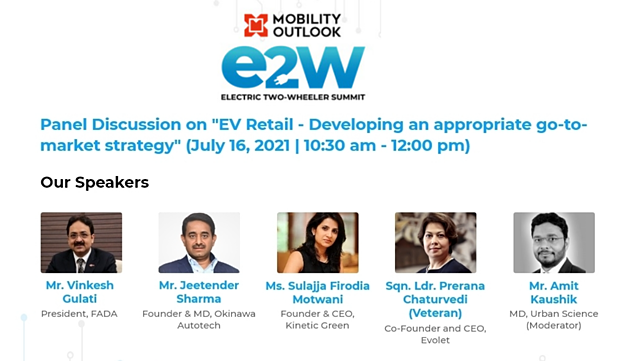
While electric vehicles continue to disrupt traditional modes of transportation, automotive retail business too will undergo a transformation in the coming times. The automotive retail sector will need a newer approach to sell electric two-wheelers (e2Ws) as they require less space for service, and need more infrastructure to create and offer experience to consumer.
A panel of experts participating in a discussion on “EV Retail – Developing an appropriate go-to-market strategy” as part of the first edition of the Electric Two-Wheeler (e2W) Summit 2021 organised by Mobility Outlook took a deep dive into what ails the retail segment, and what EV makers need to do as they prepare for future growth.
Sulajja Firodia Motwani, Founder & CEO, Kinetic Green pointed out that it is time for disruption and massive change in the retail channel. “Newer business models and formats will emerge for EV dealerships,” she added.
Kinetic Green Energy, which is planning to enter the electric two-wheeler business this year, is aiming to open smaller format stores that require less investment, with a deeper focus on dealer profitability.
Amit Kaushik, MD, Urban Science moderated the panel discussion and raised some pertinent questions on dealer viability, ones selling electric vehicles in particular. The service absorption ratio is lower as EVs have fewer parts compared to ICE engines. In this scenario, he said EV start-ups should adopt a direct to customer (D2C) model.
On this, Jeetender Sharma, Founder & MD, Okinawa Autotech said “dealership experience” is very important for electric two-wheelers. “Dealerships are an important part of our selling cycle. We use online tools for bookings but delivery and purchase happens at dealerships,” he said.
Unless the buyer experiences EVs, he or she would not buy these vehicles. Hence, for a long-term perspective and making customers aware, dealerships are an important channel, he argued. At present Okinawa has 300 dealers pan-India.
Representing the dealer fraternity, Vinkesh Gulati, President, FADA highlighted that dealers are concerned about what will happen, when the government subsidies die out. “Moreover, having fewer components in EVs compared to ICE engines is a cause of concern for dealers, as vability will go down,” he said.
He said there is still doubt in customers’ minds because of certain myths around electric vehicles. “ICE two-wheeler dealers are still not promoting electric two-wheelers. At the same time, ICE dealers don’t want their customers to go,” Gulati said.
Meanwhile, Sqn Ldr Prerana Chaturvedi, IAF Veteran and CEO, Evolet said the disruption that the telecom industry witnessed in the last 10 years, electric two-wheelers will witness that in the next five years.
The panel concluded with a view that new technologies require newer treatment from all aspects, from manufacturing to selling. And there is no doubt that new formats and new business models will emerge in the retail of electric two-wheelers in the near future.